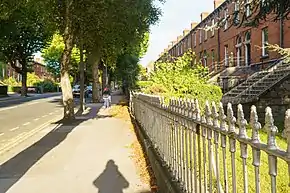North Circular Road, Dublin
The North Circular Road (Irish: An Cuarbhóthar Thuaidh), designated as the R101 regional road, is an important thoroughfare on the northside of Dublin, in Ireland. It is the northside equivalent of the South Circular Road.
 | |
|---|---|
| Bóthar R101 | |
 A section of the North Circular Road, near Phibsborough | |
| Route information | |
| Length | 5.6 km (3.5 mi) |
| Existed | 1763–present |
| Location | |
| Country | Ireland |
| Highway system | |
Location
The regional road was constructed as the northern boundary of the city, and was laid out with the South Circular Road in 1763.[1] It is still considered to separate the city centre from the inner suburbs. It runs from the Phoenix Park in the west through Phibsboro, to North Wall in the east. A number of important institutions are located along the road, including the Mater Hospital, Dalymount Park and Mountjoy Prison, and both Croke Park and St. Brendan's Hospital are nearby.[2] The majority of the original, large Victorian red brick houses have been converted into flats or apartments.[1]
The R101 and the NCR overlap for most of their lengths, and the entire NCR forms a section of the R101. In the west the R101 connects the NCR to Parkgate Street via the short Infirmary Road ; at the eastern end the R101 becomes Portland Row after the junction with Summerhill. It continues the northern loop through Saville Place , then turns east for its final kilometre via Sheriff Street (Upper) before terminating at North Wall Road (the R131).
The official description of the R101 from the Roads Act 1993 (Classification of Regional Roads) Order 2012 [3] reads:
- R101: North Circular Road, Dublin
- Between its junction with R109 at Parkgate Street and its junction with R147 at Dalymount via Infirmary Road and North Circular Road all in the city of Dublin
- and
between its junction with R135 at Berkeley Road and its junction with R131 at East Wall Road via North Circular Road, Portland Row, Seville Place, Sheriff Street Lower and Sheriff Street Upper all in the city of Dublin.
Buildings

At Hanlon's Corner, there is one of the largest office blocks built in Dublin in the 20th century, Park House. Built on the site of the Kirwan House orphanage, the block is 7 storeys over a raised basement car park. It was originally planned to be a hotel but was abandoned in 1969, with the almost completed reinforced concrete structure converted to office use. This was completed in 1973.[4] It was leased to a number of tenants, including the Department of Justice, Special Olympics Ireland, the Northern Area Health Board and the Mirror Group. In 2017, the buildings was purchased by the Technological University Dublin to incorporate into the Grangegorman campus.[5]
References
- Clerkin, Paul (2001). Dublin street names. Dublin: Gill & Macmillan. p. 132. ISBN 0-7171-3204-8. OCLC 48467800.
- Bardon, Carol and Jonathan (1988). If Ever You Go to Dublin Town. Belfast: The Blackstaff Press. p. 71. ISBN 0-85640-397-0.
- Statutory Instrument 54 of 2012 — Roads Act 1993 (Classification of Regional Roads) Order 2012, Irish Statute Book (irishstatutebook.ie). Retrieved 2017-02-02.
- McDonald 1985, p. 124.
- Quinlan, Ronald (5 October 2017). "DIT adds €9m Park House to Grangegorman campus". Irish Independent. Retrieved 10 January 2021.
Sources
- McDonald, Frank (1985). The Destruction of Dublin. Gill and MacMillan. ISBN 0-7171-1386-8.